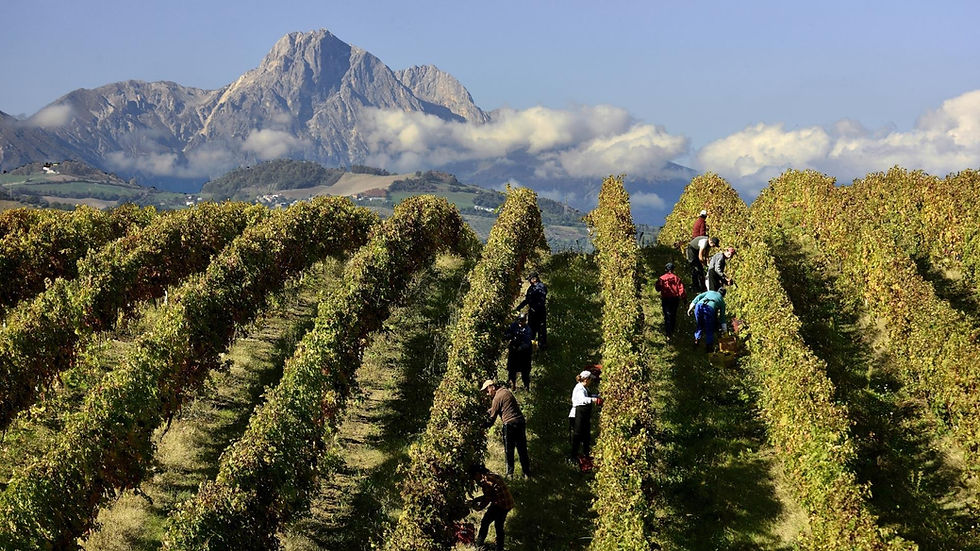Wine region in a nutshell: Puglia
- Vincent Bakker-de Bruin

- Mar 25, 2024
- 3 min read
Puglia - or Apulia - is literally and figuratively 'hot'! The Dutchies absolutely love the sultry Primitivos that come from this sun-drenched area. And with 100,000 hectares of vineyards, Puglia is one of the largest and most productive wine regions in Italy. Enough to tell you about it!

Region and climate in Puglia
When you say 'the heel of the boot', everyone knows what you mean. And that is exactly what Puglia is. A narrow area of about 350 km long with no less than 800 km of coastline! This is one of the few parts of Italy where the Apennine Mountains do not run through. In the north - above Brindisi - you will find some mountains and hills, but the south is mainly flat.
Puglia comes from the Latin word 'apuvlia' which means lack of rain. Very appropriate, because Puglia is very Mediterranean: dry, lots of sun and with a fresh breeze from the sea. In combination with the very fertile soil, up to 400 hectoliters of wine per hectare can be produced here. Compare that with the record yield of Dutch vineyards in 2022... 36 hectoliters per hectare! This has of course contributed to the production of bulk wine. The better wine regions are closest to the coast, to take full advantage of the cooling sea.
The grapes
“Wine is bottled sunshine.” That quote applies perfectly to Puglian wine! Because the grapes here become ripe and plump from the warm sun. And you can taste that, for example, with the famous Primitivo. This produces sun-drenched wines with a jammy character and ripe aromas of plums and cherries. And often quite alcoholic. Slightly lighter (and often more elegant) wines are made from the Negroamaro or Susumaniello grapes. Negroamaro is Italian for “black and bitter.” These are dark colored wines with a fine bitter taste. Susumaniello is more similar to Primitivo: sultry, full of fruit and with sweet herbs. But due to the slightly higher acidity, Susumaniello is often slightly more elegant. A fourth well-known grape is the Nero di Troia, named after the village of Troia. Like the Negroamaro, it produces wines with more tannin. Characteristic flavors are cherry and tobacco.
Although Puglia is mainly known for its red wines, 40% are whites. For example, the native Fiano is the most planted grape in Puglia. It produces white wines that are rich and full, with fresh acidity. The wines often age well and are nicely developed after a few years. The wines from Askos Verdeco are very different. These have flavors of tropical fruit, pear and are slightly spicy.
Fun fact: Puglia also has a lot of Chardonnay. And while almost all DOCs and DOCGs in Italy impose a maximum on the amount of Chardonnay that can be in a blend, in Puglia it is the other way around. Chardonnay is often required to be blended here.
The wine regions

Puglia can be roughly divided into three areas. We start in the north. The Daunia region includes the province of Foggia and is characterized by the pre-Appennine mountain range. This area is cooler than the rest of Puglia, especially in winter. Grapes that do well here are Montepulciano, Bambino and Nero di Troia.
A little further down we arrive in Murgia, the region around the city of Bari. It is a higher plateau full of hills. As a result, the temperature differences between day and night are very large. And there is a lot of rain here - by Puglian standards. The Nero di Troia also does well here. In Murgia they make it slightly richer and fruitier than in Daunia. In the southern, lower part of Murgia we encounter the king of Puglia: Primitivo. It groes very well here in the red clay soil. Before we descend further south we make a stopover in a very well-known (sub)area: Manduria. Known from the Primitivo di Manduria. This is the area for rich, deep and spicy Primitivos.
At the very tip of the heel we find Salento. This is actually a peninsula, surrounded by seas on 3 sides. The climate here is quintessentially Mediterranean with lots of sun and a fresh sea breeze. The wind protects the grapes from the heat but also keeps insects at bay. This is the land of the Negroamaro, but you also come across more and more Susumaniello. This variety was almost extinct, but at the end of the last century a number of wine growers started planting it again.
What you really must have tasted...
...is a Primitivo Appassimento. That's a Primitivo 'to-the-max'! By drying the grapes all the good stuff is concentrated. This produces wines that are even fuller, richer and more jammy than a regular Primitivo. Sounds intense, but there are winemakers who manage to keep it elegant and smooth to drink. For example, we are fans of Borgo dei Trulli Lucale Primitivo Appassimento, about which we previously wrote an extensive review. Click on the photo for the whole story!






Comments